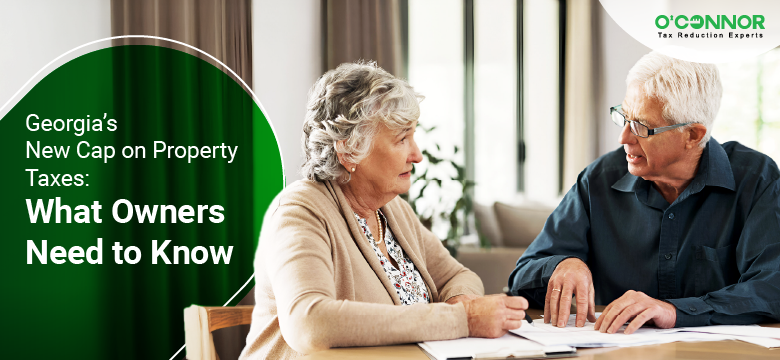
What is House Bill 581 and House Bill 92?
This past year, there have been major property tax developments for the state of Georgia that affect homeowners, especially for homesteaded property. In January 2025, House Bill 581 (HB 581), also known as “Save Our Homes Act,” went into effect. HB 581 created a floating homestead exemption with the goal of limiting or capping the annual increase in taxable assessed value of homestead properties to match inflation. This bill prevents or caps significant hikes in property tax due to increased property values. Local governments had the option to opt out of the homestead exemption by March 1, 2025.
Most local governments have opted out of the cap. However, House Bill 92 (HB 92) was enacted on April 1, 2025, to give government entities who opted out the chance to rescind their decision by April 30 of the same year. This was later extended all the way to March 2029. This means that entities can evaluate whether to accept the cap or opt out each year for tax years 2026 through 2029, with an annual renewal of the opt-out required. HB 92 also changed the definition of “homestead” to include no more than five acres of land surrounding the residence.
How do HB 581 and 92 Affect Local Governments and Homeowners?
HB 581 significantly impacts local governments because it changes how much of the value of a homestead property is taxable, meaning it also affects homeowners and how much property tax they pay. HB 581 creates a “floating” homestead exemption for owner-occupied homes, and it applies to the county, city, and school district property taxes unless the local government opts out by the deadline of March 1 each year. The floating exemption means that instead of being a set amount, the exemption is tied to the rate of inflation.
Homeowners will generally benefit due to the protection against significant property tax hikes, but only if the local government has not opted out. Some local governments may choose to opt out due to constrained revenue growth. For instance, school systems are the most financially pressured, so they have a greater reason to opt out of the cap.
Which Local Governments Have Not Opted Out?
The following are a few of the entities that have not opted out of the cap imposed by HB 581:
- Miller County government
- City of Pembroke
- City of Richmond Hill
Most major metropolitan counties, school districts, and cities, including Fulton, Gwinnett, Cobb, DeKalb, and Chatham, have opted out of the cap. Many of these entities already had local exemptions that were more beneficial than the state’s new cap under HB 581. If property owners are in these jurisdictions that have opted out, they may not be eligible to benefit from the homestead exemption.
For the entities that have not opted out of the cap that means the floating homestead exemption applies to these property owners. HB 581 caps steep tax hikes due to rising property taxes from annually increased property values. The cap could positively affect your property tax bill because it could prevent the assessed taxable value from rising at a significant rate.
For homeowners, HB 581 and 92 can offer clarity on tax bills and prevent confusion, since the legislation requires a clear disclosure on property tax bills. On the tax bill it is possible to check if your county or jurisdiction has opted out of the cap or not. You may also check with your local county assessor or tax commissioner’s website to stay up to date. Make sure to verify if your county or jurisdiction has opted out or is under the cap as this could greatly determine your property tax bill.
Important Deadlines to Consider

The following are important dates and deadlines to be aware of:
March 1, 2026-2029
For those that initially opted out; to reverse the decision, they must have done so by April 30, 2025. Between 2026–2029, opt-in must occur by March 1 of each year.
* Going forward, keep an eye on the March 1 deadlines in subsequent years in case any jurisdictions change course. Some governments might reverse course come years 2026–2029.
March 1, 2027
If a local authority opted out, it must now hold three public hearings and file a resolution with the Secretary of State by the deadline to maintain its opt-out status.
December 31, 2029
For local governments who have opted out, they are required to place a notice before the deadline on each homestead property’s ad valorem property tax bill notifying property owners of the local government’s decision to opt out. The notice must include the authority’s name and a contact number.
In the upcoming years, it is possible for entities to change their position on the cap, so property owners should remain alert to checking the status of their local government as these changes will affect their property’s assessment that could result in a higher or lower tax bill. The cap has the potential to give property owners and communities as a whole flexibility and offers transparency on property value.
How Can O’Connor Help?
O’Connor is one of the largest property tax consulting firms in the nation. With a local office in Georgia, our expert team has the in-depth knowledge of Georgia’s property tax laws, and we have top proprietary data to protest on your behalf to reduce property taxes. We offer services in Cobb, Dekalb, Fulton, and Gwinnett counties for both residential and commercial properties. Sign up today with O’Connor and only pay if we achieve a reduction.

